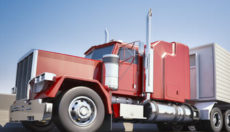
We can see the obvious—18-wheelers are bigger and longer than our passenger vehicles. They are much heavier than our passenger vehicles as well, many times weighing 20,000 to 80,000 pounds, if not more, when hauling cargo. We see them every time we get out on the road. Given the fact that the trucking industry is estimated as being a $200-$300 billion dollar industry annually, it seems unlikely that the frequency in which we encounter 18-wheelers on Texas roadways will decline anytime soon. Most of us have seen 18-wheelers lose tires, wheels, swerve from lane to lane, cut off motorists, tail-gate motorists, pull out in front of motorists, just to name a few. Equally disturbing, I’ve recently noticed an increase of 18-wheeler drivers using a cell phone while driving on the highway. As a result, many of us do not like, and have a healthy fear of, driving near and/or around 18-wheelers. Recent data and statistics from the Federal Motor Carrier Safety Administration provide that our feelings are justified.
In 2011, 3,757 people were killed in collisions with large trucks (defined as trucks over 10,000 pounds gross vehicle weight rating). Of the 3,757 people killed in collisions with large trucks in 2011, 83% (3,118) were occupants of passenger vehicles (defined as passenger cars and light trucks—vans, SUV’s, and pickup trucks—with 10,000 pounds GVWR or less), motorcyclists or pedestrians. These statistics demonstrate that we are nearly five times more likely to be killed in a fatal crash with a large truck than the driver of that large truck. Of the large trucks involved in fatal collisions, at least 65% of them were large truck tractors pulling a trailer or trailers. Further, 2.5% of large truck drivers involved in fatal crashes had a blood alcohol content (BAC) of 0.01 or greater (any measurable BAC for a large truck driver is illegal). Moreover, another 88,000 people were injured in crashes involving large trucks in 2011, and 74% (65,120) of those injured were occupants of passenger vehicles, motorcyclists or pedestrians. The number of people killed in collisions with large trucks has increased each year from 2009 to 2011. The Federal Motor Carrier Safety Administration has not yet published its 2012 Large Truck Crash Overview.
As operators of passenger vehicles, we have no control over whether the 18-wheeler driver performed a pre-trip inspection of the 18-wheeler, is performing proper maintenance on the 18-wheeler, is intoxicated, is speeding, is paying attention, is on his/her cell phone, or any number of dangerous or illegal activities. The top five driver-related factors for large trucks in fatal crashes in 2011 were speeding, distraction/inattention, failure to keep in proper lane, obscured vision, and failure to yield right-of-way. Moreover, of the fatal collisions involving large trucks where a condition of the large truck was a factor, more than 50% of the time the condition was either the large truck’s brakes and/or tires.
The Federal Motor Carrier Safety Administration (FMCSA) and The State of Texas have established rules and regulations that truck drivers are supposed to follow when operating 18-wheelers on Texas roadways and highways, but many times those rules are simply ignored. Below is a non-exhaustive list of the most common collision causing behaviors I see 18-wheeler drivers doing, both as a motorist, and through representing individuals that are severely injured by the negligence of 18-wheeler drivers:
If you have been injured or you have lost a loved one in an 18-wheeler crash, the lawyers at the Sloan Firm know and understand your rights.
Don’t settle for this point in your life. Let our Longview 18-wheeler accident lawyers help you. At the Sloan Firm, we make our clients our #1 priority!